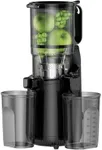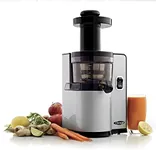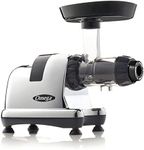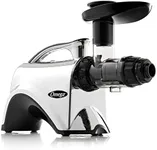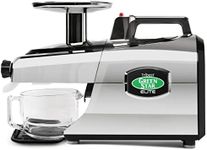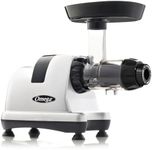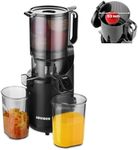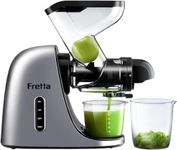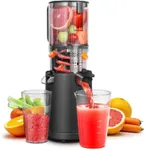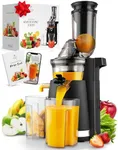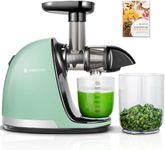Buying Guide for the Best Home Cold Press Juicer
Choosing the right home cold press juicer can significantly enhance your juicing experience, ensuring you get the most nutrients and flavor from your fruits and vegetables. Cold press juicers, also known as masticating juicers, operate at a slower speed to extract juice without generating heat, preserving more nutrients and enzymes. When selecting a cold press juicer, consider the following key specifications to find the best fit for your needs.Juicing SpeedJuicing speed refers to how quickly the juicer can extract juice from fruits and vegetables. Cold press juicers typically operate at slower speeds compared to centrifugal juicers, usually between 40 to 80 RPM (revolutions per minute). This slow speed is crucial because it minimizes heat and oxidation, preserving more nutrients and enzymes. If you prioritize nutrient retention and juice quality, opt for a juicer with a lower RPM. However, if you need to juice quickly, you might consider a model with a slightly higher RPM, though it may compromise some nutrient retention.
Juice YieldJuice yield indicates how much juice a juicer can extract from a given amount of produce. A higher juice yield means you get more juice and less waste. This is important for efficiency and cost-effectiveness, especially if you juice frequently. To determine the right juice yield for you, consider how often you plan to juice and the types of produce you will use. If you juice a lot of leafy greens, look for a juicer known for high yield with greens. For general use, a juicer with a good balance of yield for both fruits and vegetables is ideal.
Ease of CleaningEase of cleaning is a critical factor because it affects how often you will use your juicer. A juicer with many small parts and complex assembly can be time-consuming to clean, which might discourage regular use. Look for a juicer with fewer parts, dishwasher-safe components, and a design that allows for easy disassembly and reassembly. If you plan to juice daily, prioritize a model that is known for being easy to clean to ensure it fits seamlessly into your routine.
Noise LevelNoise level refers to how loud the juicer is during operation. Cold press juicers are generally quieter than centrifugal juicers, but there can still be variations. If you live in a household with others or prefer a quieter environment, consider a juicer with a lower noise level. Noise levels are often measured in decibels (dB), and a quieter juicer will typically be below 60 dB. If noise is not a major concern for you, this specification might be less critical.
Size and StorageSize and storage pertain to the physical dimensions of the juicer and how easily it can be stored when not in use. If you have limited counter space or plan to store the juicer in a cabinet, consider a more compact model. Measure your available space and compare it to the dimensions of the juicer. Additionally, consider the weight of the juicer if you plan to move it frequently. A smaller, lighter juicer is easier to handle and store, while a larger model might offer more features but require more space.
Durability and WarrantyDurability and warranty are indicators of the juicer's build quality and the manufacturer's confidence in their product. A durable juicer made from high-quality materials will last longer and perform better over time. Look for juicers with strong, sturdy components, such as stainless steel or BPA-free plastic. Additionally, a longer warranty period provides peace of mind and protection against defects. If you plan to use your juicer frequently, investing in a durable model with a good warranty is advisable.
